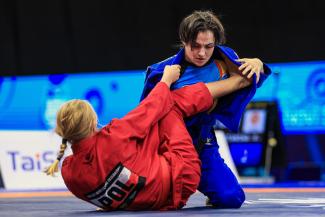Shirai gives Japan special gold; Georgia win team title
Monday, October 24, 2022 - 02:02 By Vinay Siwach

PONTEVEDRA, Spain (October 23) -- Not only Japan won a freestyle gold at the U23 Worlds after four years, but it was also a historic one.
No Japanese freestyle wrestler has won a world title in over 80kg at any age group. Tatsuya SHIRAI (JPN) changed that Sunday with gold at 86kg in Pontevedra, Spain.
On the final day of the U23 World Championships, he stunned one and all to beat Trent HIDLAY (USA) to win 3-3 in the gold medal bout to end a long drought for Japan.
With gold and two bronze medals, Japan finished eighth in the team race which was surprisingly won by Georgia with 141 points. Favorites Iran finished second with 134 points while the USA managed to get third with 112 points.
Georgia crowned two championships while Iran had four but only one wrestler of the former did not reach the medal bouts. Iran had a rather tricky tournament with only five wrestlers reaching the medal bouts.
The USA failed to crown a world champion for the first time since the 2018 U23 World Championships. It won three silver and two bronze medals.
One of the silver medals was won by Hidlay who was surprised by a strong defensive final by Shirai.
"The final was tiring," Shirai said. "After all, it was against the USA. I have never done this before so there was excitement and I had fun."
Shirai did not start on a positive note as Hidlay scored a stepout before making it 2-0 with Shirai's passivity points. But the Japan wrestler scored a stepout before a takedown gave him the lead with two minutes remaining.
He never engaged again. Hidlay, who backs himself with his underhook and pushout, was frustrated as his attacks were easily blocked by Shirai. The referee warned Shirai for not engaging and even penalized him for that.
But Shirai managed to hang on for the win. In freestyle, Hiroaki TAKAGI (JPN) made the 82kg final in the Espoir division (U20) but he was one of the eight wrestlers who failed to win the title.
"My focus is on weight training and sparring," he said. "That's all for me. And I want to improve my training."
At the Japan collegiate championships in August, Shirai won titles in both freestyle [92kg] and Greco-Roman [87kg} at Nippon Sports Science University.
He now hopes to win a spot on the Japan team for the senior world championships next year. For that, Shirai will wrestle at the Emperor's Cup in December.
"There are many rivals," he said. "I will train hard and win."
Iran's dominance
Out of the five gold medals on offer Sunday, Iran won three of them. U20 world champions Amirhossein FIROUZPOUR (IRI) and Amirreaza MASOUMI (IRI) added a U23 world title to their respective age-group gold medals.
The third gold was won by Mohmmadsadegh FIROUZPOUR (IRI) who defeated Khadzhimurad GADZHIYEV (AZE), 5-2, at 74kg.
Firouzpour gave up a takedown against Gadzhiyev but roared with his own takedown to lead 2-2 at the break, before hitting another own one in the second period to all but seal it for him.
Last year, Firouzpour fell in the final of the tournament but redeemed himself with the gold medal in Pontevedra.
At 92kg, the elder Firouzpour continued his unparalleled domination in age-group world championships. He finished with a bronze medal in the U23 Worlds last year but Firouzpour made sure he amends that record by winning the 92kg gold against Jacob CARDENAS (USA), 10-0.
The third gold medal was won by Masoumi who defeated Solomon MANASHVILI (GEO), 13-2, in the 125kg final. Manasvili scored two stepouts to open the scoring but that was all he would score.
Masoumi exposed the poor conditioning of Manashvili, and scored 13 answered points with ease to win his third gold at age-group tournaments.
The fifth gold was captured by Arsen HARUTYUNYAN (ARM) who became a two-time world champion at the U23 level.
Wrestling Taiyrbek ZHUMASHBEK UULU (KGZ) in the 61kg, Harutyunyan led 1-0 with the point for passivity. But he started the second period with a takedown to make it 3-0. But Zhumashbek Uulu scored a takedown using duck under in the activity period to lead 3-3 on criteria.
Harutyunyan then rallied for a takedown and leg lace to make it 7-1. A late stepout against Harutyunyan just changed the score of the win. The two-time world bronze medal took home with gold medal 7-5.
RESULTS
61kg
GOLD: Arsen HARUTYUNYAN (ARM) df. Taiyrbek ZHUMASHBEK UULU (KGZ), 7-5
BRONZE: Emrah ORMANOGLU (TUR) df. Aaron NAGAO (USA), 9-4
BRONZE: Assyl AITAKYN (KAZ) df. Ramaz TURMANIDZE (GEO), 12-4
74kg
GOLD: Mohmmadsadegh FIROUZPOUR (IRI) df. Khadzhimurad GADZHIYEV (AZE), 5-2
BRONZE: Vasile DIACON (MDA) df. Hrayr ALIKHANYAN (ARM), 7-3
BRONZE: Vadym KURYLENKO (UKR) df. Temuri BERUASHVILI (GEO), via inj. def.
86kg
GOLD: Tatsuya SHIRAI (JPN) df. Trent HIDLAY (USA), 3-3
BRONZE: Emre CIFTCI (TUR) df. Evsem SHVELIDZE (GEO), 12-5
BRONZE: Ivan ICHIZLI (MDA) df. Maksat SATYBALDY (KAZ), 4-3
92kg
GOLD: Amirhossein FIROUZPOUR (IRI) df. Jacob CARDENAS (USA), 10-0
BRONZE: Feyzullah AKTURK (TUR) df. Rizabek AITMUKHAN (KAZ), 14-3
BRONZE: Miriani MAISURADZE (GEO) df. Denys SAHALIUK (UKR), 5-3
125kg
GOLD: Amirreza MASOUMI (IRI) df. Solomon MANASHVILI (GEO), 13-2
BRONZE: Anthony CASSIOPPI (USA) df. Yurii IDZINSKYI (UKR), via inj. def.
BRONZE: Alisher YERGALI (KAZ) df. Milan KORCSOG (HUN), 6-1


Share your thoughts.
Comments